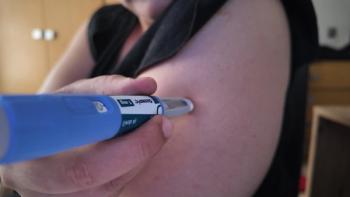
COVID-19 Pandemic Shows ‘Silver Lining’ of Virtual Visits for Veterans Who Have Survived Cancer
Due to the COVID-19 pandemic, many patients’ and survivors’ care has changed, but one nurse and her team sought to make this population more comfortable and safe during these times with virtual visits.
Virtual visits from cancer care coordinators with veteran colon cancer survivors decreased anxiety and improved patients’ satisfaction during the COVID-19 pandemic, according to a virtual poster presentation at the Oncology Nursing Society Congress.
Due to social distancing requirements during the COVID-19 pandemic, many veterans who are cancer survivors experienced changes in treatment protocols and schedules. This resulted in higher levels of stress and anxiety about changes in their outcome and survival, on top of stress about their cancer diagnosis, noted Janice Schwartz, MSN, OCN, RN, an oncology certified nurse at the New Mexico VA Healthcare System, said during the presentation.
“As a cancer care coordinator, my role morphed abruptly in March 2020. I was faced with calling veterans living with a cancer diagnosis to advise them of cancelled procedures, visits and surgeries due to the COVID-19 pandemic. I found veterans living with a cancer diagnosis were experiencing new stressors. Already experiencing anxiety related to the diagnosis of cancer that we are all familiar with, they now face limitations of [COVID-19] further impacting their lives.”
Providers found a new way to connect with this population to improve communication through virtual visits to potentially decrease stress about COVID-19 and improve patients’ satisfaction regarding their survivorship care.
“I have found maintaining visual contact with a veteran allows them to feel connected, to know that we are still here for them and has improved patient’s satisfaction,” Schwartz said.
Prior to the virtual appointments, veterans were emailed instructions on how to use the platform and scheduling on a personal laptop, tablet, computer or smartphone. Upon completion of the appointment, they were emailed a survey, of which 100% were returned.
During the virtual appointments, veterans were given reassurance regarding cancer treatment and recommendations, in addition to COVID-19 safety measures and processes to decrease possible exposure.
A total of 95% of the veterans reported an overall decrease in anxiety after the virtual appointment. The appointments decreased COVID-19 related stress in 90% of veterans and led to improved patient satisfaction in 96% of veterans.
The virtual appointments resulted in the following:
- overall convenience (less time off work, avoidance of travel and expenses, not having to search for parking and ability to stay safely at home),
- decreased anxiety (decreased post-traumatic stress disorder symptoms, less worry and less nervousness),
- decreased stressors (ability to stay safety at home, understanding safety measures implemented in the hospital and review of recommended)
- and improved satisfaction (personalized visit vs. phone call, ability to see their chart and reports through shared screen options and requested to have virtual post COVID-19).
Limitations of the virtual appointments included requiring an electronic device with a camera, connection to internet, Apple misfunctions, remembering usernames and passwords.
“I’ve learned by saying that perhaps if we look to the end of the rainbow and search for the silver lining of [COVID-19], we would see the many advances in care such as virtual platforms that will continue to improve care and decrease barriers for our veterans long after [the COVID-19 pandemic],” Schwartz concluded.
Reference
Schwartz J, Valdez-Boyle L. Colorectal Cancer Survivorship: Enhancing Communication During COVID-19 Through Cancer Care Coordinator Virtual Visits in the Veterans Healthcare System. Presented at: Oncology Nursing Society 46th Annual Congress. April 20, 22, 27 & 29, 2021. Virtual.
Newsletter
Knowledge is power. Don’t miss the most recent breakthroughs in cancer care.



































